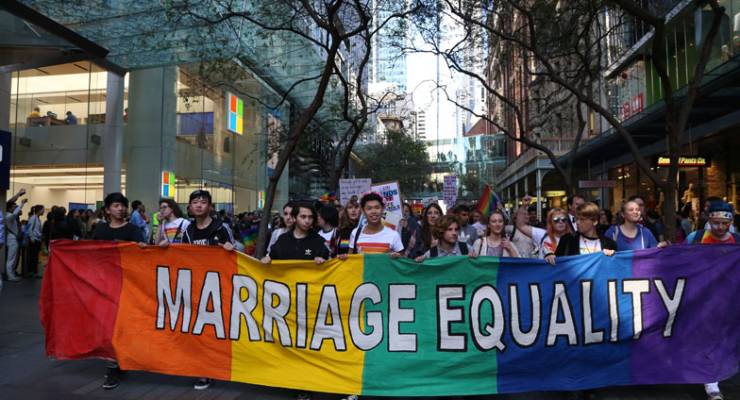
After years of sitting on the sidelines, what provoked the Australian Council of Trade Unions to finally decide to back marriage equality?
In a motion passed on Tuesday at the ACTU’s executive meeting in the Northern Territory, the organisation stated that all people in Australia must be treated equally before the law, and noted Labor’s commitment to amending the Marriage Act, as well as growing support within the community.
The ACTU strongly opposed the plebiscite, stating it was costly and would “result in significant public vilification of a wide range of people, including the children of same-sex couples, and have no more legal standing than an opinion poll”:
“The ACTU Executive believes that during a time when more people are having their jobs destroyed, their wages cut, and their living standards diminished, it is not appropriate to spend in excess of $160 million on a national opinion poll. $160 million would be better spent on providing training to young unemployed workers, restoring refuge services for the victims of domestic violence or putting back funding that was stripped out of much-needed community legal services.”
A source at the meeting told Crikey that despite the long history of opposition from the socially conservative Shop, Distributive & Allied Employees’ Association, the motion this week was not controversial. For the past few years, given the long-held “intense opposition” to marriage equality from the Shoppies’ union, led by Joe de Bruyn, the unions had made a decision not to take up the cause with the ACTU. De Bruyn’s skills, and his support for other unions on industrial issues, are held in high regard in the ACTU, and the other unions decided to hold off on coming down in favour of marriage equality.
The other unions had been polling their member bases on the issue of marriage equality and there has been overwhelming support for some time. But after the Shoppies last month made a decision to drop their long-held opposition to the issue and allow ALP members to vote their conscience on the matter, there was a push to get the ACTU to endorse marriage equality. This is despite Shoppies’ national secretary Gerard Dwyer telling The Australian earlier this month that he believed the ACTU would allow unions to hold individual positions on marriage equality before the plebiscite or parliamentary vote.
[How Coalition homophobes could set marriage plebiscite up to fail]
De Bruyn’s opposition to marriage equality was given an expiration date at the Labor national conference last year, with the party voting to force its elected members into a binding vote in favour of marriage equality after the 45th Parliament in 2019.
It is unclear what role the unions might play in any plebiscite or parliamentary vote. The unions are expected to begin taking a more public role in the debate but wanted the focus of this week’s executive meeting in the Northern Territory to be on the 50th anniversary of the Wave Hill walk-off.
Those who are most in favour of the plebiscite this week are now saying that they will ignore the result if it does not go their way. In a podcast this week, ultra right-wing Senator Eric Abetz said he found it “bizarre” that he should be expected to be bound by the result given those who want the change — but oppose the plebiscite — would not be bound if it went the other way.
In the same episode, the Australian Christian Lobby’s Lyle Shelton — who has several times said the matter was “settled” when the Parliament voted down same-sex marriage in the past — claimed he would “respect” the outcome of the plebiscite, but would not consider the matter over.
“We’ll accept the result, but I personally can’t believe what I think is a lie in public policy, and I will continue to make the case. It might take us many, many years to convince people but I think the issue of marriage, if it is redefined, won’t be a settled issue.”








So Mr Abetz and the ACT’s Mr Seselja won’t be bound by a plebiscite if it doesn’t go their way. WOW $160 million on a survey whose results are not binding on the peoples parliamentary representatives, maybe they will put more thought into if they had to carry some of the cost burden?
$150 million on a non binding plebiscite is a disgraceful waste of money. Let’s just have a vote in Parliament and move on.
But why are trade unions even discussing this issue? At a time when workers’ conditions and pay are being threatened, why is this issue so important to unions? By all means, individual unionists may (perhaps should) have strong views. But such issues are a distraction for unions which are already failing in their main role. A suggestion: ask the members of the HSU if this is an important issue for them.